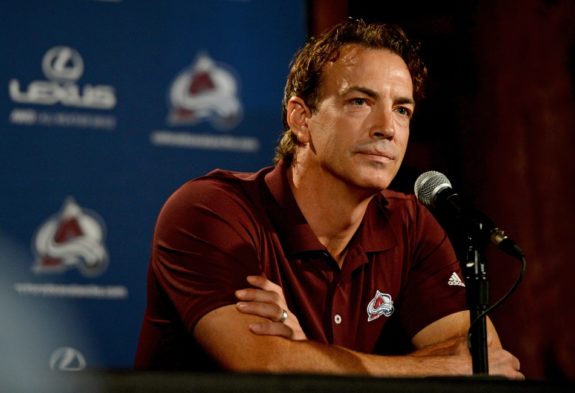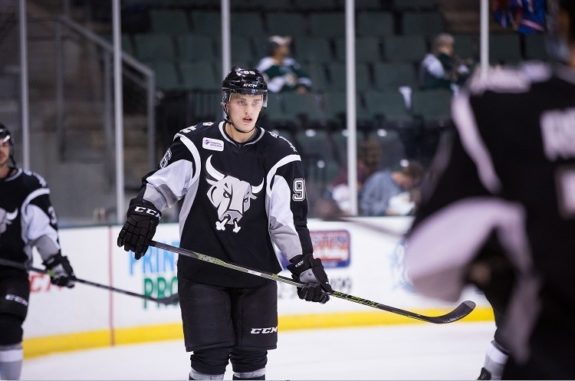The Colorado Avalanche intended to shift their AHL affiliation this summer, but the postseason changes didn’t stop there. Intent on instilling a winning culture throughout the player development process, the Avalanche used the AHL affiliation move as the impetus to restructure their entire process.

In recent years, NHL teams have moved towards cultivating an affiliation with an AHL club as their ‘minor league’ development program, with the AHL team drawing on an ECHL team as their ‘farm club’. Players can get shuffled up and down the pipeline as they develop skills, injuries occur and playoff scenarios develop. For the past few years, the San Antonio Rampage has been the Avalanche’s AHL partner while the Colorado Eagles have been their ECHL club.
The Colorado Eagles Move to the AHL
Last summer, the shift began. The Vegas Golden Knights entered their inaugural NHL season needing to develop a farm system. The Knights snagged the Chicago Wolves as their new AHL affiliate, leaving the Wolves former NHL partner – the St. Louis Blues – high and dry. Colorado and St. Louis entered into an agreement to share the Rampage for the 2017-2018.

Meanwhile, the Avalanche negotiated a deal to bring up the Colorado Eagles to the AHL for the 2018 season, expanding the AHL to 31 teams (just like the NHL) in the process. The first piece of development change. Last October, executive vice president and general manager Joe Sakic as well as assistant general manager Craig Billington headed less than an hour up the road to the Colorado Eagles Loveland facility to announce the new 10-year agreement with the Eagles. And that was the extent of the information – until recently.
The Avalanche/St. Louis Blues sharing arrangement with the Rampage proved uniquely challenging. Unfortunately for Rampage Coach Eric Veilleux, the team missed the playoffs for the second year of his tenure. News emerged Veilleux would not be moving forward with the organization while the Avalanche were battling through the first round of the NHL playoffs. The Blues also passed on Veilleus, who went on to a head coaching position with the Halifax Mooseheads.
Speculation swirled about who would lead the Eagles as they jumped to the AHL and whether their current coaching staff could advance with the organization. Expectations ramped up during development camp when the Eagles staff played a prominent role. There were some good reasons to want the Eagles’ coaches to continue into the AHL. The Eagles own a record of success. They won their second straight Kelly Cup June 9, were conference champions for three years in a row, and had five consecutive second-round postseason appearances. Meanwhile, the Avalanche’s previous AHL affiliates hadn’t reached the postseason in seven years, the longest drought of any NHL club.
They say once is just lucky, but two in a row is skill 😏#Back2BackBoys #EaglesCountry pic.twitter.com/2O6BYhzEBZ
— Colorado Eagles (@ColoradoEagles) June 10, 2018
The Eagles’ winning culture looked mighty appealing and hopes emerged they could translate that success onto an AHL stage.
Greg Cronin Becomes the Eagles’ Coach
On July 12, both the Eagles and the Avalanche announced Greg Cronin would take on the head coaching job for the AHL club. Cronin, who spent the last four years as an assistant with the New York Islanders, is a veteran with 30 years coaching experience.
The @Avalanche have announced that Greg Cronin will be the head coach of the @ColoradoEagles next season.
Details: https://t.co/vUJB78ociD pic.twitter.com/Tfsr3wWeJo
— American Hockey League (@TheAHL) July 13, 2018
However, he seems an odd choice for an NHL team focused on moving into the new younger, faster style of play. Last year, the Islanders ranked 27th in the league in shots against and struggled with clearing the puck. In a 2013 interview, he stated he did not believe shot differentials were good indicators of possession. During a year when his Toronto Maple Leafs team surrendered the most shots on goal in the league.
In the highly competitive and changing NHL environment, Cronin’s hire raises some questions. The Avalanche have a lot of young defensive talent in their pipeline who need to adapt to the quicker pace of play and practice successful defensive strategies, including a focus on puck possession. Colorado’s player development pipeline as a whole has been a bit of a mixed bag and one would hope the Avalanche would take the opportunity in the midst of their structural changes to bring in a fresh wind. It’s the perfect time to make a change but whether the second significant shift – hiring a new AHL coach – improves anything remains a question.
The Eagles’ Staff Also Promoted to the AHL
The silver lining, though, could be the third substantial change. The Avalanche decided to promote the Eagles coaching staff to the AHL along with the club. Shortly after Cronin’s hiring was announced, news emerged that Aaron Schneekloth, the Eagles head coach who engineered back-to-back Kelly Cup wins, will stay with the team as an assistant, as will Ryan Tobler and goaltending coach Ryan Bach. If Cronin comes in as the person with the AHL/NHL experience to guide the Eagles in adapting to the NHL while allowing the other coaches to work their magic with the players, that could be a promising combination.
David Oliver Leaves the Avalanche
The development shake-up doesn’t end with a new AHL coach. A fourth key element came into play the day Colorado announced Cronin was hired. Rumors began to circulate that David Oliver, the Avalanche Director of Player Development, was being considered for a position with the New York Rangers. Five days later, Oliver officially joined the Rangers as an assistant coach. His departure marks a substantial shift in the development program as Oliver has been the director for four years and has been with the Avalanche for 11 years.
The real question – who will fill Oliver’s shoes? As of now, nothing has been announced. If Cronin moves into more of Oliver’s role with the organization, he could turn out to be an effective addition. He was one of the co-founders of the United States National Development Program. He was an AHL coach for a couple of years. He understands the ins and outs of player movement, cultivating a system of player progression, and how to work with all three teams involved in an organization. He has a wide range of experience working with college players, national teams, junior programs, as well as AHL and NHL teams. In a managerial role, Cronin could be a quality acquisition.
The Utah Grizzlies Join the Organization
All of which leads to the fifth and final piece of change. With the promotion of the Eagles to the AHL, the Avalanche needed a new ECHL team. Near the end of June, the Utah Grizzlies announced their new partnership with the Colorado Avalanche and Eagles. The Grizzlies also maintain a winning tradition, making the playoffs in 10 of their past 11 season.

Formerly affiliated with the Anaheim Ducks, the Grizzlies have been pursuing a partnership with the Avalanche for years before everything aligned for the shift to happen. Back in the 1994-1995, an IHL club named the Denver Grizzlies spent a single year in Denver, winning the Turner Trophy. Their tenure was brief as the Avalanche came to Colorado just a few weeks after that championship.
This summer, the Avalanche have streamlined their player pipeline by bringing up the Eagles to the AHL and partnering with the Grizzlies. The Eagles are less than an hour drive down the road and the Grizzlies are a short plane hop away. The close proximity should help make it easy to keep an eye on players’ progressions and simplify movement. It should also be easier to synchronize strategies and systems so players can move seamlessly throughout the organization. The big question remains. With all the changes, will the Avalanche be building a better development system? Only time will tell.